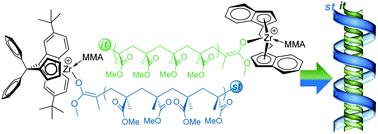Stereocomplex poly(methyl methacrylate), sc-PMMA, is a crystalline material formed via van der Waals interactions between diastereomeric, isotactic (it) and syndiotactic (st), PMMA chains. It represents a rare example of helical supramolecular structures derived from a commodity polymer and is typically obtained in a 1/2 it/st ratio either in the solid state, when annealed, or in suitable solvents, when crystallized. In this study, Chen and co-workers hypothesized that, with the advent of stereospecific and living coordination polymerization by chiral metallocene catalysts, it is possible to combine the synthesis of highly stereoregular PMMAs with the fabrication of their crystalline stereocomplex into a one-step procedure, thereby producing such important crystalline materials in a rapid and cost/energy-saving fashion.
The authors demonstrate the first in situ stereocomplexing polymerization of MMA using a pair of diastereospecific coordination polymerization catalysts for rapid, high-yield, ambient-temperature production of crystalline sc-PMMA. The diastereospecific catalyst pair is conveniently generated by in situ activation of a mixture of C2- and Cs -ligated metallocene bis(ester enolate)s with [Ph3C][B(C6F5)4], which is highly active, stereospecific, and controlled for coordination–addition polymerization of MMA. The isotactic/syndiotactic (it/st) composition of the sc-PMMA materials can be modulated by simply adjusting the relative ratio of the diastereospecific catalysts. The dynamic light scattering (DLS) results of the in situ stereocomplexing polymerization by a diastereospecific catalyst pair, obtained by monitoring the reaction in real time with DLS, indicate that stereocomplexation occurs as the diastereomeric PMMA chains are continuously growing. The presence of nanocages such as POSS and C60, which can be encapsulated by st-PMMA, in the stereocomplexing MMA polymerization system can completely disrupt or have no effect on the stereocomplexation, or enable both stereocomplexation and inclusion complexation processes to occur, depending on the type of nanocage employed.
.
In situ stereocomplexing polymerization of methyl methacrylate by diastereospecific metallocene catalyst pairs by Nicole C. Escudé, Yalan Ning and Eugene Y.-X. Chen, Polym. Chem., 2012, 3, 3247-3255.
Julien Nicolas is a guest web-writer for Polymer Chemistry. He currently works at Univ. Paris-Sud (FR) as a CNRS researcher











